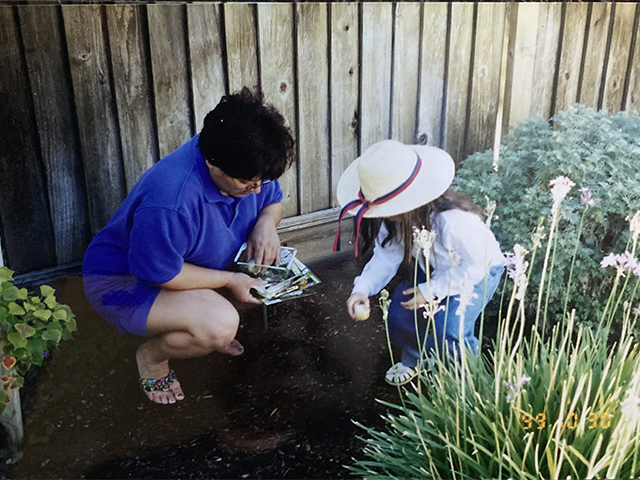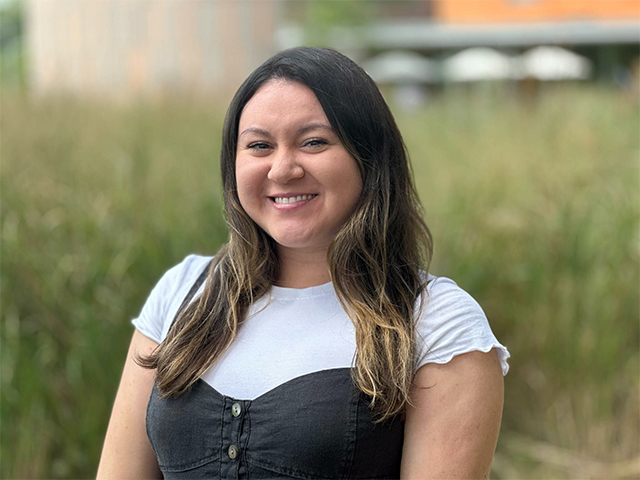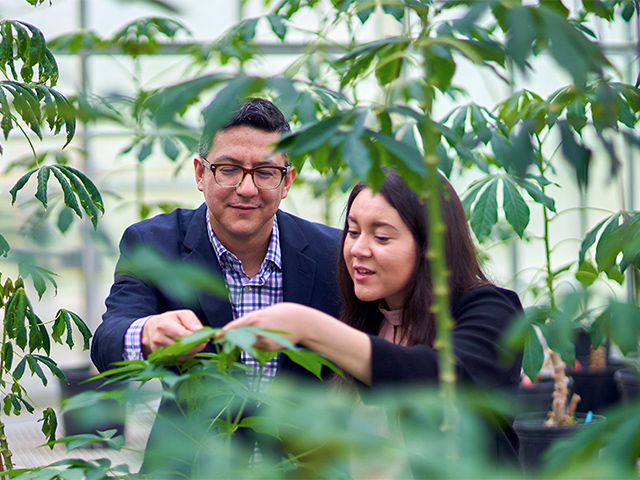Capturing the Light: Meet 2024 WHD Fellow Sarah Pardi
Growing up in the Bay Area, Sarah Pardi helped her mom plant a vegetable garden. She loved being out in nature and getting her hands dirty in the soil—and remembers being amazed that a tiny rock-like seed could somehow grow into a large (and tasty) plant.
“Both my parents are avid gardeners – every single weekend, constantly planning and planting. That appreciation of plants has definitely been passed down,” she adds.

Young Sarah and her mom working in their garden. She credits her parents’ love of gardening for her early interest in plant science.
Indeed, it has: Sarah Pardi has been named the Danforth Center’s 2024 William H. Danforth Fellow. The fellowship is awarded each year to an outstanding PhD student whose research demonstrates great promise for advancing plant science.

2024 William H. Danforth Plant Science Fellow Sarah Pardi
From Cali to STL
Armed with a green thumb, Sarah decided to study biology at Loyola Marymount University in Los Angeles. She did a 3-year stint in the plant molecular biology lab, studying legume-microbe interactions. Sarah credits her mentor there with pushing her to pursue graduate school. “Her love and passion for the subject were contagious.” As a Mexican-American woman, Sarah secured a McNair Scholarship designed to encourage underrepresented students to attend graduate programs. She started looking at programs.
“I applied to a lot of plant biology PhD programs and eventually narrowed it down to Wash U. But what ultimately drew me to St. Louis was the Donald Danforth Plant Science Center. I told myself ‘I have to work here!’ “
From Soil to Signal
Sarah is now a sixth-year PhD student in the Plant and Microbial Biosciences Program at Washington University in St. Louis. When she did her first-year rotation, she tried out two microbe research labs, as well as the lab of Danforth Center Principal Investigator Dmitri A. Nusinow, PhD, a noted expert in plant circadian rhythms.
“What I realized was that my curiosity lies in molecular signaling – how plants interact with their environment. Whether that’s with microbes or with light, it’s all molecular mechanisms of plants interacting with their environment.”
Today, Sarah’s thesis focuses on how plants perceive light, a crucial component of yield maximization, and Dr. Nusinow is her advisor.

Sarah with her thesis advisor, Danforth Center Principal Investigator Dmitri A. Nusinow, PhD.
Seeing the Light
Light is a critical environmental stimulus for plants, serving as both an energy source (via photosynthesis) and a signal for developmental programming. Plants perceive light through various light-responsive proteins, and Sarah is studying how these proteins perform their specific function.
“If we can understand at the molecular level how plants are able to see and respond to light, then we can develop crops to maximize light-use efficiency and grow more food.”
Sarah’s inquiry involves “biomolecular condensates,” a type of membrane-less organelle. This research not only holds promise to improve agriculture, but also has potential application in human medicine. By understanding this mechanism in plants, Sarah's work could potentially shed light on neuro-degenerative diseases like Alzheimer’s and Huntington’s, which share a similar mechanism.
Make a Difference
The WHD Fellowship was endowed by Dr. P. Roy and Diana Vagelos to support outstanding PhD students in plant science. If you are interested in creating opportunities for bright, early-career scientists, visit our Get Involved pages to learn about the many ways you can support our mission.